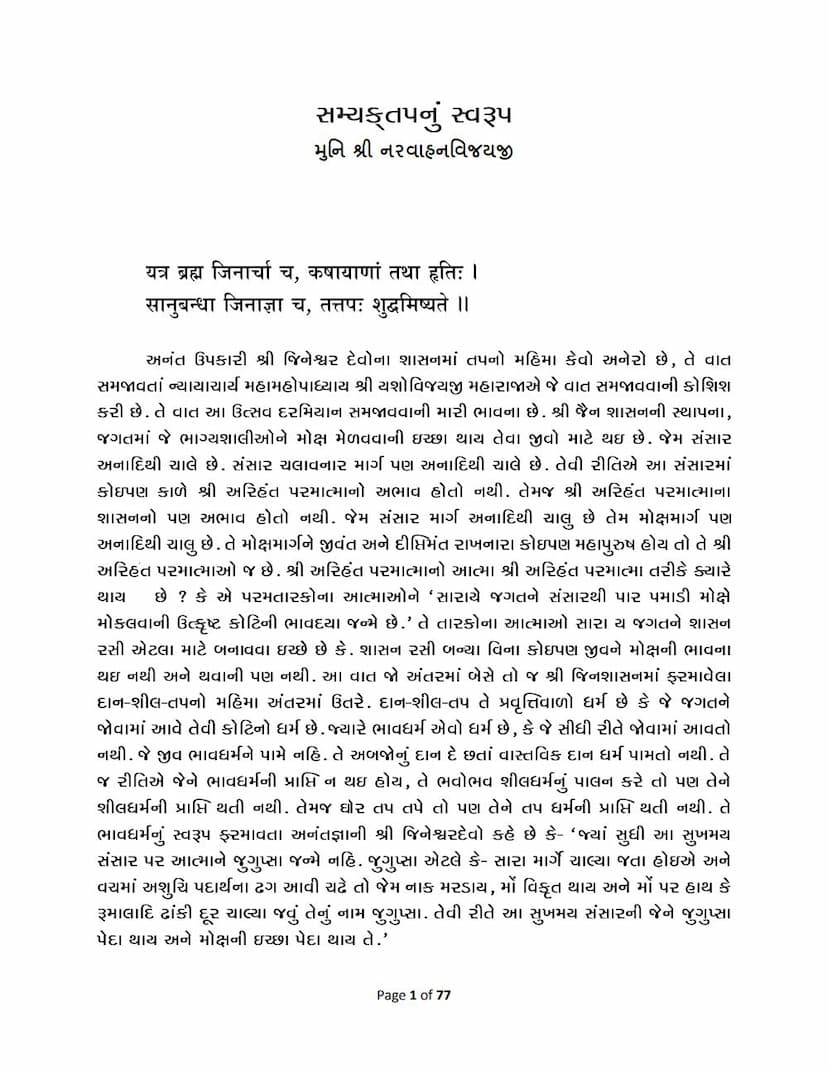Samyak Tapnu Swarup
Added to library: September 2, 2025

Summary
This Jain text, "Samyak Tapnu Swarup" (The Nature of Right Austerity) by Narvahanvijay, discusses the profound significance and true nature of Tapas (austerity) within Jainism. The author emphasizes that mere physical hardship is not the essence of true Tapas. Instead, genuine Tapas is deeply intertwined with the core principles of Jainism: right faith (Samyak Darshan), right knowledge (Samyak Gyan), and right conduct (Samyak Charitra).
Here's a breakdown of the key themes and arguments presented in the text:
1. The True Nature of Tapas:
- Beyond Physicality: The text strongly asserts that Tapas is not just about abstaining from food or enduring physical discomfort. It's a spiritual practice aimed at purifying the soul and eradicating karmic matter.
- Inner Purity is Paramount: The core of Tapas lies in internal purification, particularly the suppression and eventual eradication of passions (Kashayas - anger, pride, deceit, and greed). Without this inner transformation, external austerities are considered ineffective or even detrimental.
- Intention Matters: The motivation behind Tapas is crucial. It should be driven by a genuine desire for liberation (Moksha) and adherence to the teachings of the Tirthankaras, not for worldly recognition or fleeting benefits.
- The Four Pillars of Jain Dharma: The text frequently mentions Dana (charity), Shila (virtuous conduct/vows), and Bhava (spiritual inclination/emotions) as integral components that complement Tapas. True Tapas is practiced in conjunction with these, fostering a holistic spiritual approach.
2. The Importance of Jinagya (The Lord's Command):
- Adherence to Teachings: The text repeatedly stresses the importance of following the commands and guidelines laid down by the Tirthankaras. Tapas performed against the Lord's commands, or without understanding their essence, is deemed impure.
- Understanding the Essence: It's not enough to simply perform the prescribed austerities; one must understand the underlying principles and intentions behind them.
3. Key Components of Pure Tapas (as per the verse):
The introductory verse highlights four essential elements for pure Tapas:
- Brahmacharya (Celibacy/Spiritual Conduct): This refers to not only physical celibacy but also controlling the senses, mind, and thoughts, dedicating oneself to spiritual pursuits and the soul's true nature. It signifies detachment from worldly pleasures and deep introspection.
- Jinarcha (Worship of the Tirthankaras): This involves devotion and reverence towards the omniscient beings. It signifies recognizing their teachings and striving to emulate their path to liberation.
- Kashayanam Hritih (Subjugation of Passions): This is the core of inner purification. It means actively working to reduce and eliminate anger, pride, deceit, and greed.
- Sanubandha Jinagya (Binding Adherence to the Lord's Commands): This signifies unwavering commitment to the Jain way of life, integrating the Lord's teachings into every aspect of one's existence, ensuring the continuity of spiritual practice.
4. The Role of External vs. Internal Tapas:
- External Tapas as a Tool: External austerities (like fasting, abstaining from certain foods) are presented as tools or aids to cultivate internal purity. They are valuable when they facilitate the reduction of passions and senses.
- Internal Tapas as the Goal: The ultimate aim is internal Tapas, which involves controlling the mind, senses, and passions, cultivating virtues, and deepening one's spiritual understanding.
5. The Motivation for Tapas:
- Renunciation of the World: True Tapas arises from a sense of disgust (Jugupsa) towards worldly pleasures and a strong longing for liberation (Moksha).
- Eradication of Karmas: Tapas is the means to burn away accumulated negative karmas (Karmas) that bind the soul to the cycle of birth and death.
6. Examples and Analogies:
The text uses examples, including the austerities of the first Tirthankara, Lord Rishabhadeva, to illustrate the principles. It also uses analogies to explain concepts like the digestive process and the importance of right intention.
7. The Importance of Proper Observance and Intent:
- Consequences of Misunderstanding: The text warns that performing austerities with wrong intentions or without proper understanding can lead to further karmic bondage.
- The Role of Devotion and Conduct: The author emphasizes that true Tapas is accompanied by devotion to the Tirthankaras and adherence to Jain ethical principles.
8. The Call to Action:
The text encourages the audience to understand the true meaning of Tapas and to practice it diligently according to their capacity, emphasizing that even supporting and appreciating those who perform Tapas contributes to spiritual progress. The ultimate goal is to achieve self-realization and liberation from the cycle of birth and death.
In essence, "Samyak Tapnu Swarup" serves as a guide, urging Jains to move beyond superficial observances and embrace Tapas as a profound spiritual discipline for soul purification and ultimate freedom, deeply rooted in right faith, knowledge, and conduct, and always guided by the teachings of the Tirthankaras.